大学英语精读第一册Unit2译文
- 格式:doc
- 大小:43.00 KB
- 文档页数:11
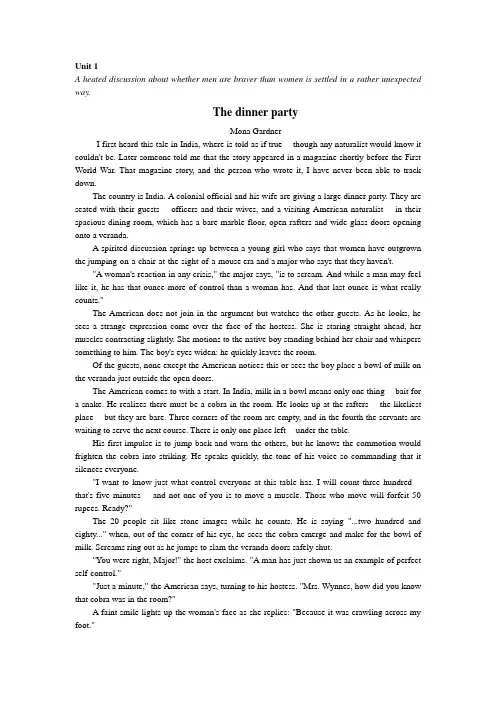
Unit 1A heated discussion about whether men are braver than women is settled in a rather unexpected way.The dinner partyMona GardnerI first heard this tale in India, where is told as if true -- though any naturalist would know it couldn't be. Later someone told me that the story appeared in a magazine shortly before the First World War. That magazine story, and the person who wrote it, I have never been able to track down.The country is India. A colonial official and his wife are giving a large dinner party. They are seated with their guests -- officers and their wives, and a visiting American naturalist -- in their spacious dining room, which has a bare marble floor, open rafters and wide glass doors opening onto a veranda.A spirited discussion springs up between a young girl who says that women have outgrown the jumping-on-a-chair-at-the-sight-of-a-mouse era and a major who says that they haven't."A woman's reaction in any crisis," the major says, "is to scream. And while a man may feel like it, he has that ounce more of control than a woman has. And that last ounce is what really counts."The American does not join in the argument but watches the other guests. As he looks, he sees a strange expression come over the face of the hostess. She is staring straight ahead, her muscles contracting slightly. She motions to the native boy standing behind her chair and whispers something to him. The boy's eyes widen: he quickly leaves the room.Of the guests, none except the American notices this or sees the boy place a bowl of milk on the veranda just outside the open doors.The American comes to with a start. In India, milk in a bowl means only one thing -- bait for a snake. He realizes there must be a cobra in the room. He looks up at the rafters -- the likeliest place -- but they are bare. Three corners of the room are empty, and in the fourth the servants are waiting to serve the next course. There is only one place left -- under the table.His first impulse is to jump back and warn the others, but he knows the commotion would frighten the cobra into striking. He speaks quickly, the tone of his voice so commanding that it silences everyone."I want to know just what control everyone at this table has. I will count three hundred -- that's five minutes -- and not one of you is to move a muscle. Those who move will forfeit 50 rupees. Ready?"The 20 people sit like stone images while he counts. He is saying "...two hundred and eighty..." when, out of the corner of his eye, he sees the cobra emerge and make for the bowl of milk. Screams ring out as he jumps to slam the veranda doors safely shut."You were right, Major!" the host exclaims. "A man has just shown us an example of perfect self-control.""Just a minute," the American says, turning to his hostess. "Mrs. Wynnes, how did you know that cobra was in the room?"A faint smile lights up the woman's face as she replies: "Because it was crawling across my foot."关于男人是否比女人更勇敢的一场激烈争论以一种颇为出人意料的方式解决了。
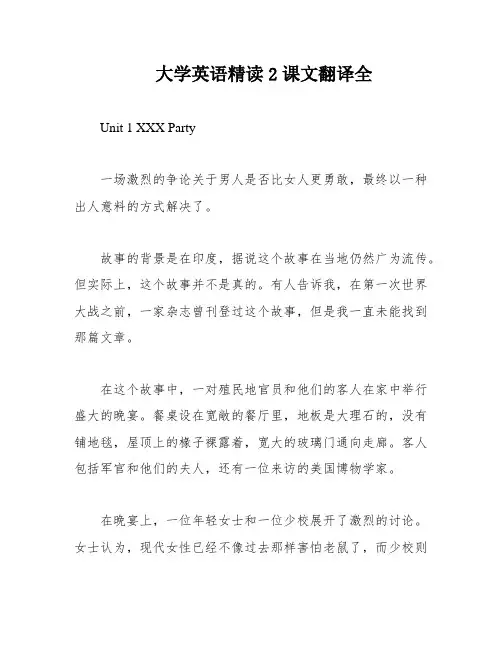
大学英语精读2课文翻译全Unit 1 XXX Party一场激烈的争论关于男人是否比女人更勇敢,最终以一种出人意料的方式解决了。
故事的背景是在印度,据说这个故事在当地仍然广为流传。
但实际上,这个故事并不是真的。
有人告诉我,在第一次世界大战之前,一家杂志曾刊登过这个故事,但是我一直未能找到那篇文章。
在这个故事中,一对殖民地官员和他们的客人在家中举行盛大的晚宴。
餐桌设在宽敞的餐厅里,地板是大理石的,没有铺地毯,屋顶上的椽子裸露着,宽大的玻璃门通向走廊。
客人包括军官和他们的夫人,还有一位来访的美国博物学家。
在晚宴上,一位年轻女士和一位少校展开了激烈的讨论。
女士认为,现代女性已经不像过去那样害怕老鼠了,而少校则不同意。
他认为,女人在遇到危险时会尖叫,而男人则会更加冷静。
在场的美国博物学家没有参加讨论,他只是静静地观察着其他客人。
突然间,他注意到女主人的表情有些奇怪。
她盯着前方,脸部肌肉在微微抽搐。
她向站在座椅后面的印度男仆做了个手势,对他耳语了几句。
男仆两眼睁得的,迅速地离开了餐室。
只有美国博物学家注意到这一幕,其他人都没有察觉到。
他意识到,碗中的牛奶是用来引蛇的诱饵。
他抬头看了看屋顶上的椽子,但是那里没有蛇。
室内的三个角落也没有蛇,而在第四个角落里,仆人们正在等着上下一道菜。
这样,剩下的唯一可能藏蛇的地方就是餐桌下面。
他想要往后一跳并向其他人发出警告,但他知道这样会引起骚乱,使眼镜蛇受惊咬人。
于是他讲了一通话,语气非常威严,使所有人都安静了下来。
“我想了解一下在座的诸位到底有多大的克制力,我数三百下,也就是五分钟,你们谁都不许动一动。
动者将罚款五十卢比。
准备好!”在我等待进大学的时候,我在一份地方报纸上看到了一则广告,说是在伦敦某郊区,距离我家约十英里的地方有一所学校正在招聘教师。
由于手头很拮据,同时也想做点有用的事情,我便提出了申请。
然而,我也担心自己没有学位,没有教学经验,得到这份工作的可能性微乎其微。
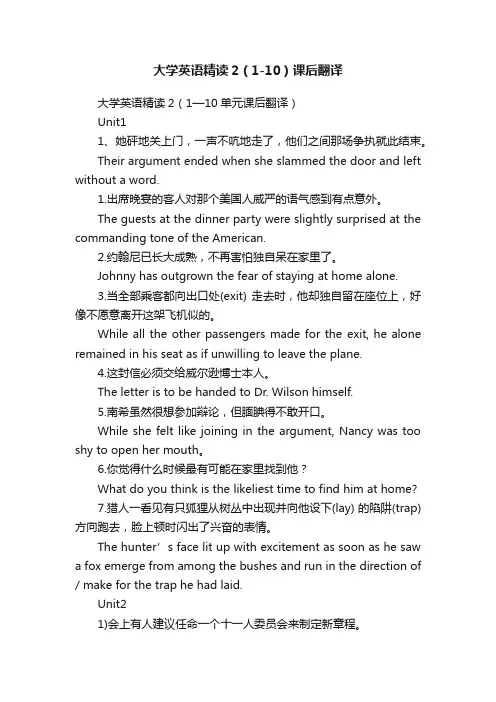
大学英语精读2(1-10)课后翻译大学英语精读2(1—10单元课后翻译)Unit11、她砰地关上门,一声不吭地走了,他们之间那场争执就此结束。
Their argument ended when she slammed the door and left without a word.1.出席晚宴的客人对那个美国人威严的语气感到有点意外。
The guests at the dinner party were slightly surprised at the commanding tone of the American.2.约翰尼已长大成熟,不再害怕独自呆在家里了。
Johnny has outgrown the fear of staying at home alone.3.当全部乘客都向出口处(exit) 走去时,他却独自留在座位上,好像不愿意离开这架飞机似的。
While all the other passengers made for the exit, he alone remained in his seat as if unwilling to leave the plane.4.这封信必须交给威尔逊博士本人。
The letter is to be handed to Dr. Wilson himself.5.南希虽然很想参加辩论,但腼腆得不敢开口。
While she felt like joining in the argument, Nancy was too shy to open her mouth。
6.你觉得什么时候最有可能在家里找到他?What do you think is the likeliest time to find him at home?7.猎人一看见有只狐狸从树丛中出现并向他设下(lay) 的陷阱(trap) 方向跑去,脸上顿时闪出了兴奋的表情。
The hunter’s face lit up with excitement as soon as he saw a fox emerge from among the bushes and run in the direction of / make for the trap he had laid.Unit21)会上有人建议任命一个十一人委员会来制定新章程。
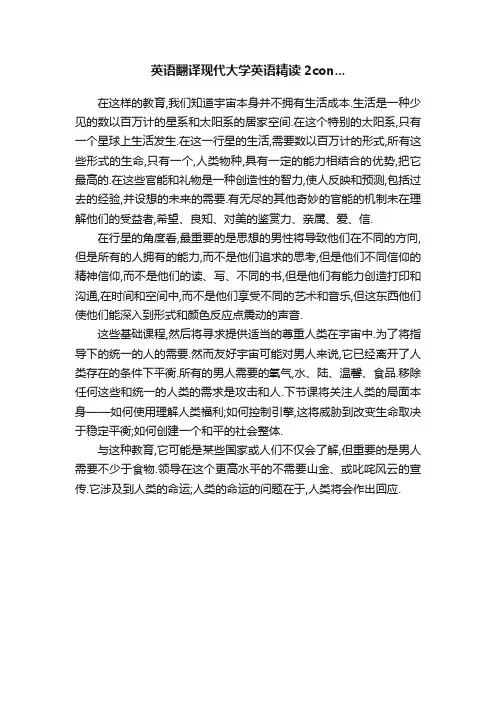
英语翻译现代大学英语精读2con...
在这样的教育,我们知道宇宙本身并不拥有生活成本.生活是一种少见的数以百万计的星系和太阳系的居家空间.在这个特别的太阳系,只有一个星球上生活发生.在这一行星的生活,需要数以百万计的形式,所有这些形式的生命,只有一个,人类物种,具有一定的能力相结合的优势,把它最高的.在这些官能和礼物是一种创造性的智力,使人反映和预测,包括过去的经验,并设想的未来的需要.有无尽的其他奇妙的官能的机制未在理解他们的受益者,希望、良知、对美的鉴赏力、亲属、爱、信.
在行星的角度看,最重要的是思想的男性将导致他们在不同的方向,但是所有的人拥有的能力,而不是他们追求的思考,但是他们不同信仰的精神信仰,而不是他们的读、写、不同的书,但是他们有能力创造打印和沟通,在时间和空间中,而不是他们享受不同的艺术和音乐,但这东西他们使他们能深入到形式和颜色反应点震动的声音.
这些基础课程,然后将寻求提供适当的尊重人类在宇宙中.为了将指导下的统一的人的需要.然而友好宇宙可能对男人来说,它已经离开了人类存在的条件下平衡.所有的男人需要的氧气,水、陆、温馨、食品.移除任何这些和统一的人类的需求是攻击和人.下节课将关注人类的局面本身——如何使用理解人类福利;如何控制引擎,这将威胁到改变生命取决于稳定平衡;如何创建一个和平的社会整体.
与这种教育,它可能是某些国家或人们不仅会了解,但重要的是男人需要不少于食物.领导在这个更高水平的不需要山金、或叱咤风云的宣传.它涉及到人类的命运;人类的命运的问题在于,人类将会作出回应.。
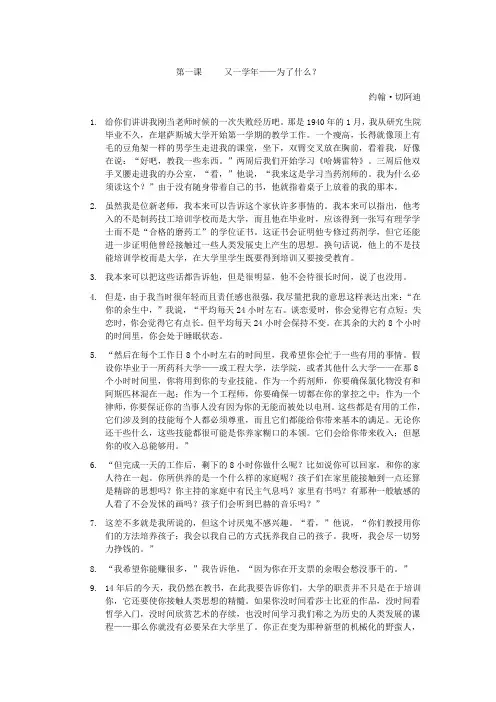
第一课又一学年——为了什么?约翰·切阿迪1.给你们讲讲我刚当老师时候的一次失败经历吧。
那是1940年的1月,我从研究生院毕业不久,在堪萨斯城大学开始第一学期的教学工作。
一个瘦高,长得就像顶上有毛的豆角架一样的男学生走进我的课堂,坐下,双臂交叉放在胸前,看着我,好像在说:“好吧,教我一些东西。
”两周后我们开始学习《哈姆雷特》。
三周后他双手叉腰走进我的办公室,“看,”他说,“我来这是学习当药剂师的。
我为什么必须读这个?”由于没有随身带着自己的书,他就指着桌子上放着的我的那本。
2.虽然我是位新老师,我本来可以告诉这个家伙许多事情的。
我本来可以指出,他考入的不是制药技工培训学校而是大学,而且他在毕业时,应该得到一张写有理学学士而不是“合格的磨药工”的学位证书。
这证书会证明他专修过药剂学,但它还能进一步证明他曾经接触过一些人类发展史上产生的思想。
换句话说,他上的不是技能培训学校而是大学,在大学里学生既要得到培训又要接受教育。
3.我本来可以把这些话都告诉他,但是很明显,他不会待很长时间,说了也没用。
4.但是,由于我当时很年轻而且责任感也很强,我尽量把我的意思这样表达出来:“在你的余生中,”我说,“平均每天24小时左右。
谈恋爱时,你会觉得它有点短;失恋时,你会觉得它有点长。
但平均每天24小时会保持不变。
在其余的大约8个小时的时间里,你会处于睡眠状态。
5.“然后在每个工作日8个小时左右的时间里,我希望你会忙于一些有用的事情。
假设你毕业于一所药科大学——或工程大学,法学院,或者其他什么大学——在那8个小时时间里,你将用到你的专业技能。
作为一个药剂师,你要确保氯化物没有和阿斯匹林混在一起;作为一个工程师,你要确保一切都在你的掌控之中;作为一个律师,你要保证你的当事人没有因为你的无能而被处以电刑。
这些都是有用的工作,它们涉及到的技能每个人都必须尊重,而且它们都能给你带来基本的满足。
无论你还干些什么,这些技能都很可能是你养家糊口的本领。
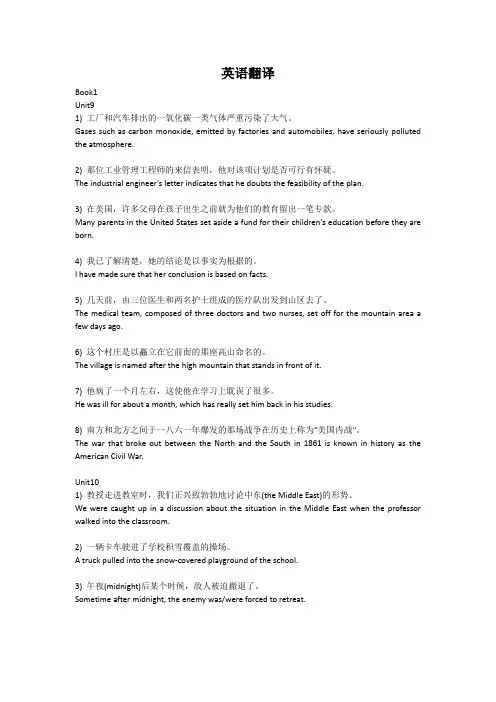
英语翻译Book1Unit91) 工厂和汽车排出的一氧化碳一类气体严重污染了大气。
Gases such as carbon monoxide, emitted by factories and automobiles, have seriously polluted the atmosphere.2) 那位工业管理工程师的来信表明,他对该项计划是否可行有怀疑。
The industrial engineer's letter indicates that he doubts the feasibility of the plan.3) 在美国,许多父母在孩子出生之前就为他们的教育留出一笔专款。
Many parents in the United States set aside a fund for their children's education before they are born.4) 我已了解清楚,她的结论是以事实为根据的。
I have made sure that her conclusion is based on facts.5) 几天前,由三位医生和两名护士组成的医疗队出发到山区去了。
The medical team, composed of three doctors and two nurses, set off for the mountain area a few days ago.6) 这个村庄是以矗立在它前面的那座高山命名的。
The village is named after the high mountain that stands in front of it.7) 他病了一个月左右,这使他在学习上耽误了很多。
He was ill for about a month, which has really set him back in his studies.8) 南方和北方之间于一八六一年爆发的那场战争在历史上称为"美国内战"。
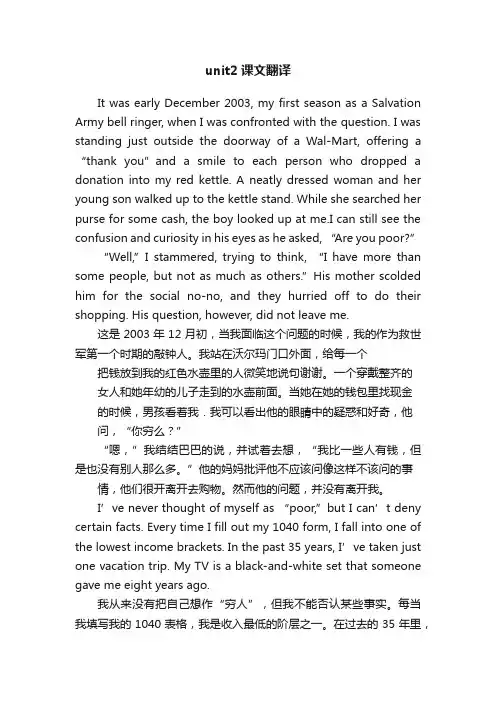
unit2课文翻译It was early December 2003, my first season as a Salvation Army bell ringer, when I was confronted with the question. I was standing just outside the doorway of a Wal-Mart, offering a “thank you”and a smile to each person who dropped a donation into my red kettle. A neatly dressed woman and her young son walked up to the kettle stand. While she searched her purse for some cash, the boy looked up at me.I can still see the conf usion and curiosity in his eyes as he asked, “Are you poor?”“Well,”I stammered, trying to think, “I have more than some people, but not as much as others.”His mother scolded him for the social no-no, and they hurried off to do their shopping. His question, however, did not leave me.这是2003年12月初,当我面临这个问题的时候,我的作为救世军第一个时期的敲钟人。
我站在沃尔玛门口外面,给每一个把钱放到我的红色水壶里的人微笑地说句谢谢。
一个穿戴整齐的女人和她年幼的儿子走到的水壶前面。
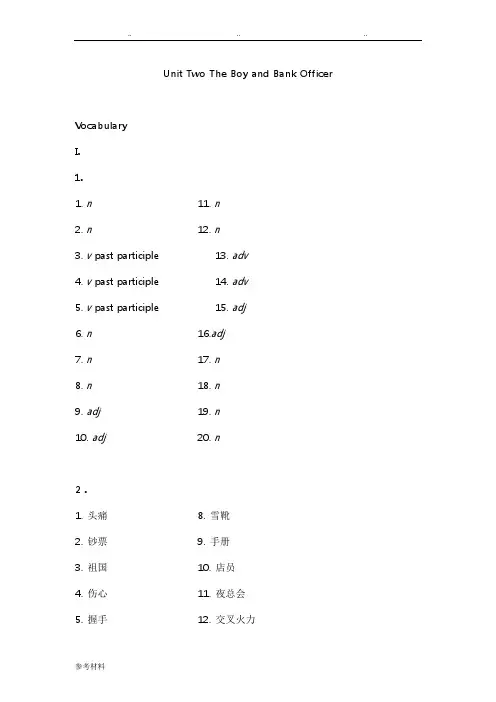
Unit Two The Boy and Bank OfficerVocabularyI.1.1. n11. n2. n12. n3. v past participle 13. adv4. v past participle 14. adv5. v past participle 15. adj6. n16.adj7. n 17. n8. n18. n9. adj 19. n10. adj 20. n2.1. 头痛8. 雪靴2. 钞票9. 手册3. 祖国10. 店员4. 伤心11. 夜总会5. 握手12. 交叉火力6. 山体滑坡13. 月光3.1. 繁星密布的填空10. 有钱人2. 狂风暴雨肆虐的大海11. 雨季3. 棉花般的雪12. 银发4. 多山地区13. 红润的面颊5. 落基山脉14. 多刺的鱼6. 肉嘟嘟的鼻子15. 瘦骨嶙峋的女孩儿7. 多毛的胸部16.气味难闻的奶酪8. 浓密的眉毛17.咸味食品9. 卷曲的毛发18. 华而不实的语言4.1. 一个男子突然站了起来,用他的鞋子朝他扔过去。
幸亏他及时低头躲了过去。
2. 我们再他回家前把房间通通风吧。
3. 她虽然八十大好几了,但还能穿针引线。
4. 我们必须勇敢面对这个危险。
总有人要在我们这里浑水摸鱼。
5. 她清楚地知道,如果她把那钱放进口袋,她就会倒大霉。
6. 会议是由一个刚刚平步青云,掌握大权的妇女主持的。
7. 正如老话所说,剥猫皮可以有很多办法。
(不必墨守成规)8. 一对年轻的恋人坠入爱河,仅因为此,他们被人们用石头活活砸死。
9. 我希望贫富差距能够缩小。
前两天我见到一个饿急了的年轻人在一家饭店里狼吞虎咽地吃残羹剩饭。
10.桌子上的食品看起来是如此的诱人,我都流口水了。
2 Complete the following verb+ noun collocation or expressions.1. have/keep/open/close2. have/keep/ show/ lose3. attend/hold/chair/have/open/close4. change/read/speak5. give/hold6. make/send/save/pay/earn/deposit/withdraw/change/borrow/lend7. wear/show/give/use8. obey/follow/make/change/break9. have/spend/keep/waste/kill/save/count/lose10. protect/represent/consider3. Complete the sentences by translating the Chinese in the brackets according to the sentence patterns in bold.1. is that we can’t find enough foreign markets2. is that without democracy there is no harmonious society3. is that we should give/allow students more freedom4. is not strong enough to be her husband5. reliable enough to be her husband6. is not big enough to hold so many people7. There doesn’t seem to be any different opinion8. Because at that time there seemed to be enough food for everybody9. Because there didn’t seem to be any good reason at that time.10. because he was being followed at that time11. my car is being repaired/fixed12. I hear it is being criticized by many people13. a good doctor, but he doesn’t know much about history14. an excellent English professor, but she doesn’t know much about history15. we may be poor, but we are no beggars16. I shouldn’t have told her in such a hurry.17. I shouldn’t have gone18. we should have listened to them.4. Fill in blanks with correct forms of the words and phrases listed below1.move in on, happened to 5. Because of, hand over2.aware of 6. the other day, on duty3.heard of 7. on the case, as to4.think twice 8. in the first place5. Fill in the blanks with the correct prepositions or adverbs.1. on 5. down upon2. into 6. up3. up 7. up to4. forward to6. Translate the following sentences into English1.It seemed impossible to me, but all the others looked very confident2.We looked around. There wasn’t building standing in sight. Theearthquake seemed to have destroyed everything.3.–He seemed to be in low spirits these days. I wonder why.--I think it’s because he doesn’t seem to be making much progress in his studies. He is afraid of being looked down upon by his classmates. 4.– What are you looking for, Dick?--I seem to have lost my key. How annoying!5. If you find a word that does not seem to make any sense in the sentence,you should look it up in the dictionary. That’s the only way to learn to usea word.6. They went on arguing for hours. Neither was willing to listen to the other.I suddenly remembered someone saying “Discussion is an exchange ofknowledge while argument is an exchange of ignorance”7. The situation there seems to be very complicated. The government haspromised to look into it.8. My grandpa seems to be getting better and better, but he still needssomebody to look after him.9. Economists have already come to the conclusion that the crisis seems to becoming to an end. World economy is looking up.10. When I got well I looked at my bank account. To my sadness, I found mybalance was almost zero. All my savings in the past three years were gone.7. Fill in each blank with correct form of the appropriate word in thebrackets. Note that more than one word may be appropriate1. say, ago2. before, remember/recall3. spoke, say4. speak/tell, after, speak5. After, since6. bring/take, since/because (Use “bring” if she was coming to you, and “take”if she was leaving you)7. question, since/when8. Remember, bring9. matter, problemGrammar1.Study the given patterns and rewrite the following sentences after theexample.1.You ought to invite him to sing at the New Year Party2.You ought to do something a bit more challenging3.We ought to start preparing for celebration4.You ought to relax and stop worrying about him.5.If I knew their phone number, I would surely call them.6.If I was in charge here, I would help you.7.If I was offered the job, I would take it for sure.8.If I had a warm coast with me, I wouldn’t feel so cold.9.If his parents could afford it, they would support him at college.10.Ted might be able to solve these problems if he were here with us.2.Rewrite the following sentences by using subjunctive mood after theexample.1.Jack shouldn’t have done that /thrown the exam paper to the floor.2.People shouldn’t have wasted waster like that.3.Joe shouldn’t have lied to his parents. / He shouldn’t have spent hisparents’ hard-earned money like that.4.I should not have given up so easily.5.I should not have jumped the queue. / He shouldn’t have behaved likethat.6.Li Tong’s parents shouldn’t have read her private letter without herpermission.7.I don’t think the students should have overacted. (They should have calledthe security on campus)3.Fill in each blank of the passage with ONE suitable word.(1) types/kinds (2) lending (3) for (4) is(5) pay (6) opening (7) balance (8) store/keep/save/put4.Translate the following sentences using one of the patterns listed inGrammar exercises 1-2.1.You ought to try a different method.2.I think you ought to talk with our writing teacher about it.3.we ought to report the theft to the police immediately4.You ought to go and see your parents more often now that they are notin good health.5.You shouldn’t have shouted at the elders like that6.You shouldn’t have been late for such an important meeting7.Isn’t Jim your friend? You shouldn’t have turned down/rejected his offer ofhelp.8.As a college students, you shouldn’t have spent all your free time playingcomputer games.9.If I failed this time, I would try for the second time.10.If global warming continued, these islands would disappear.11.If I had a million yuan, I would buy my parents an apartment12.If I were elected president of the students’ union, I might organize a pianocompetition.5.Identify and correct the mistake (s) in each of the sentences.1.No one knew what had happened/ was happening there. No one knowswhat is happening/has happened there.2.My parents had a good reason to be angry with me. I shouldn’t have liedto them in the first place.3.The new Prime Minister is well aware that his government is faced with alot of problems./ The new Prime Minister is well aware of the problems his government is faced with.4.If you won the prize, what would you do with the money.5.The guest was greeted with a bunch of flowers at the airport.6.The teller was arguing with a young customer about something when thenarrator entered the bank.7.The narrator thought the bank’s policy was ridiculous。
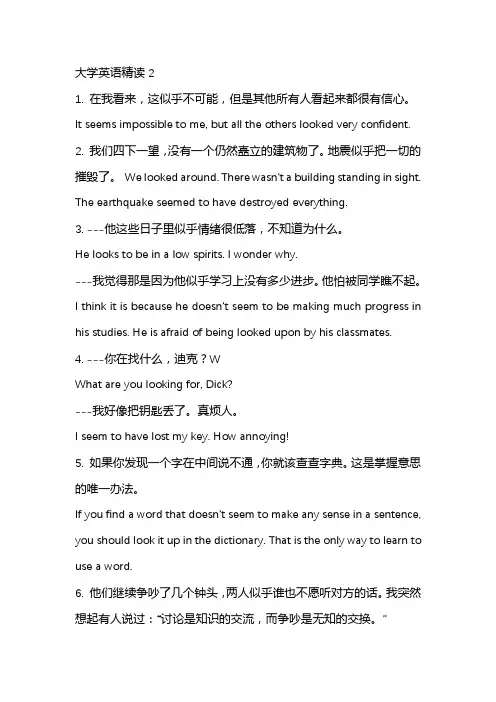
大学英语精读21. 在我看来,这似乎不可能,但是其他所有人看起来都很有信心。
It seems impossible to me, but all the others looked very confident.2. 我们四下一望,没有一个仍然矗立的建筑物了。
地震似乎把一切的摧毁了。
We looked around. There wasn‘t a building standing in sight. The earthquake seemed to have destroyed everything.3. ---他这些日子里似乎情绪很低落,不知道为什么。
He looks to be in a low spirits. I wonder why.---我觉得那是因为他似乎学习上没有多少进步。
他怕被同学瞧不起。
I think it is because he doesn‘t seem to be making much progress in his studies. He is afraid of being looked upon by his classmates.4. ---你在找什么,迪克?WWhat are you looking for, Dick?---我好像把钥匙丢了。
真烦人。
I seem to have lost my key. How annoying!5. 如果你发现一个字在中间说不通,你就该查查字典。
这是掌握意思的唯一办法。
If you find a word that doesn‘t seem to make any sense in a sentence, you should look it up in the dictionary. That is the only way to learn to use a word.6. 他们继续争吵了几个钟头,两人似乎谁也不愿听对方的话。
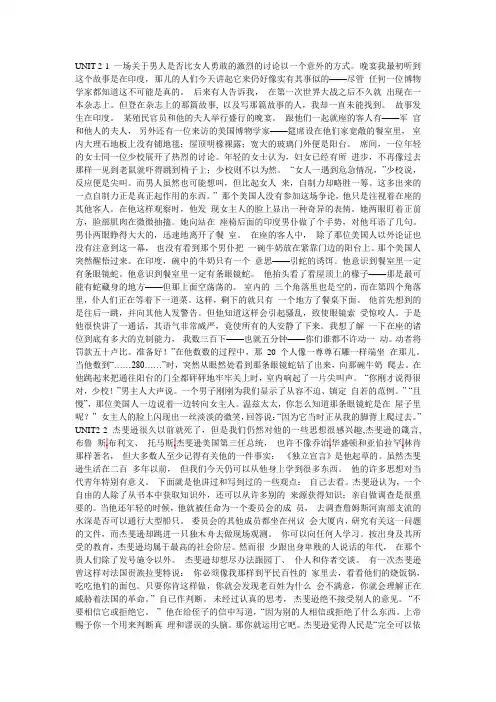
UNIT 2-1 一场关于男人是否比女人勇敢的激烈的讨论以一个意外的方式。
晚宴我最初听到这个故事是在印度,那儿的人们今天讲起它来仍好像实有其事似的——尽管任何一位博物学家都知道这不可能是真的。
后来有人告诉我,在第一次世界大战之后不久就出现在一本杂志上。
但登在杂志上的那篇故事, 以及写那篇故事的人,我却一直未能找到。
故事发生在印度。
某殖民官员和他的夫人举行盛行的晚宴。
跟他们一起就座的客人有——军官和他人的夫人,另外还有一位来访的美国博物学家——筵席设在他们家宽敞的餐室里,室内大理石地板上没有铺地毯;屋顶明椽裸露;宽大的玻璃门外便是阳台。
席间,一位年轻的女士同一位少校展开了热烈的讨论。
年轻的女士认为,妇女已经有所进步,不再像过去那样一见到老鼠就吓得跳到椅子上;少校则不以为然。
“女人一遇到危急情况,”少校说,反应便是尖叫。
而男人虽然也可能想叫,但比起女人来,自制力却略胜一筹。
这多出来的一点自制力正是真正起作用的东西。
” 那个美国人没有参加这场争论,他只是注视着在座的其他客人。
在他这样观察时,他发现女主人的脸上显出一种奇异的表情。
她两眼盯着正前方,脸部肌肉在微微抽搐。
她向站在座椅后面的印度男仆做了个手势,对他耳语了几句。
男仆两眼睁得大大的,迅速地离开了餐室。
在座的客人中,除了那位美国人以外论证也没有注意到这一幕,也没有看到那个男仆把一碗牛奶放在紧靠门边的阳台上。
那个美国人突然醒悟过来。
在印度,碗中的牛奶只有一个意思——引蛇的诱饵。
他意识到餐室里一定有条眼镜蛇。
他意识到餐室里一定有条眼镜蛇。
他抬头看了看屋顶上的椽子——那是最可能有蛇藏身的地方——但那上面空荡荡的。
室内的三个角落里也是空的,而在第四个角落里,仆人们正在等着下一道菜。
这样,剩下的就只有一个地方了餐桌下面。
他首先想到的是往后一跳,并向其他人发警告。
但他知道这样会引起骚乱,致使眼镜索受惊咬人。
于是他很快讲了一通话,其语气非常威严,竟使所有的人安静了下来。
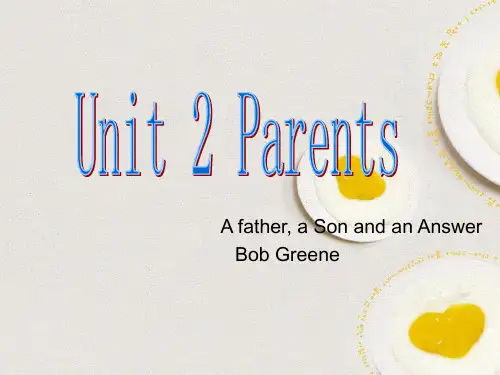
大学英语精读第三版(上海外语教育出版社董亚芬主编)第一册Book1 Unit2答案1)e2)c3)b4)h5)g6)i7)d8)j9)f10)a1) retire2) device3) contact4) conquered5) gave up nearby6) all by herself7) nightmare8) accomplished9) Moreover10) by far11) was determined12) turned over13) Fortunately14) following15)In spite of1) can't help feeling/can't help thinking2) wakened3) dissuade him from4) set out to improve5) had previously met6) by far the most1) experience2) inexperience3) experiencing4) inexperienced5) experienced6) experienced1) doubtful2) doubts3) doubted4) undoubtedly5) doubtfully6) undoubtedly1) fortune2) Fortunately3) unfortunate4) Fortunately5) Unfortunately6) fortunate7) Misfortunes1) American2) an American3) China4) a Chinese5) Canada6) Canadian7) English8) an Englishman9) France10) a Frenchman11) Japan12) Japanese13) a Greek14) India15) Indian16) German17) a German18) Spain19) Italian1) beaten/defeated2) defeated3) won4) defeated5) won6) beat/defeated1) It was a 28,500-mile voyage.2) We took a five-day tour.3) That student wrote a ten-page report.4) Sam's new apartment is in a twelve-story building.5) It is a thirteenth century castle.6) They are fourth year students.7) It is first-class material.8) It is definitely second-class work.1) They looked both ways before crossing the street.2) I made my decision after talking to Sir Francis.3) They had dinner before going to the concert.4) Chichester sent a radio message to London after succeeding in sailing round Cape Horn.1) He was determined to carry out his plan in spite of his illness.2) They aren't doing well in school in spite of their intelligence.3) He isn't very happy in spite of his wealth.4) He isn't a very good basketball player in spite of his height.1) what you have written2) what we should always keep in mind3) What they saw in China4) what we can do today1) In spite of2) cancer3) determined4) accomplish5) set out6) voyage7) dissuade8) give up9) covered10) previously1) conquer2) about3) succeeded4) between5) through6) high7) sail8) follow/take9) round10) then11) but12) As13) made14) fast15) did16) ever17) that1) hard to reach2) adventure3) set out4) sprung up5) rough6) worried7) carried out8) worst9) lifted high10) floated away翻译1) 幸好附近有家医院,我们立刻把他送到了那里。
大学英语精读一翻译答案Translation for reference unit 11.Mrs. Smith complained to me that she often found it simply impossible to communicate with her 16-year-olddaughter.2.I firmly believed that reading simplified English novels is an easy and enjoyable way of enlarging ourvocabulary.3.I don’t think we are doing enough to protect our environment from pollution.4.In addition to /Apart from writing compositions on a weekly basis, our English teacher assigned us 8 books toread during the summer vacation.5.We’ve learned from reliable sources that a native English speaker is going to teach us spoken English nextterm/semester.6.Seeing English movies on a regular basis will not only improve your ear, but will also help you build yourspeaking skills.7.If you have any questions about these learning strategies, please feel free to ask me. and I’ll explain them ingreater detail.8.The Canadian girl is good at seizing every opportunity to speak Chinese. That’s why she has gained a goodcommand of spoken Chinese in less than three years. T ranslation for reference unit 21.Fortunately there was a hospital nearby and we took him there at once.2.After succeeding in landing on George Island, the captain sent a radio message to the headquarters.3.He is determined to continue his experiment but this time he’ll do it another way.4.When she read the novel, she couldn’t help thinking of the five years she had spent in the countryside.5.Mary thought it difficult to carry out her plan all by herself.6.We didn’t think he could cover the distance in a quarter of an hour, but he succeeded in doing it.7.Even after his doctor told him he had lung cancer, Chichester would not give up his old dream of sailinground the world.8.I was busy making a new device for catching rats when Mark came and dragged me out to a flower show.Translation for reference UNIT 31.That famous actor seemed content to play a minor role in the play.2.National Day is round the corner. Let’s give our bedroom a thorough clean.3.She agreed, very reluctantly, to be operated on by a young doctor.4.They’ve arranged for us to visit the Great Wall tomorrow. I’m sure we’ll have a good time there.5.After reading the letter the old man was so disappointed that he tore it into little bits with trembling fingers.6.The old couple were proud of their grandson, who got two gold medals and a bronze at the 28th OlympicGames.7.Even if his grandmother could not come to his birthday party, she would send him a lovely present. Tom wassure of that.8.Ta was Mary’s 20th birthday yesterday. Her father sent her a pair of boots. Her mother bought her a box ofchocolates. And her boyfriend brought her a bunch of roses. UNIT 41.T o take this job would involve working on weekends freq uently, b ut John d id n’t mind.2.It is well known that lung cancer is caused at least in part by smoking too much.3.My grandparents said that the man who invented television had once lived in their neighb orhood.4.I propose that we go to find Prof. Smith in his office right after the meeting and invite him to ourEnglish evening.5.Having been operated on twice for the disease, she was so weakened that she could barely stand up.cators think that the generation growing up with television spent so much of their time in front ofthe TV that they do not have enough time to study.7.I do hope that you can come up with a better solution that this one.8.At first glance the picture didn’t look very good, but after examining it carefully, we found that it was indeeda masterpiece. Translation for reference UNIT 51.Jane picked up a magazine from the bookshelf and started reading here and there at random.2.With this letter I enclose some illustrations for the story.3.The ancient building was enclosed by a high wall.4.Dr. Green is busy with working on a cure for AIDS, but from next month on he’ll be able to fit in 20 patientsor so on Monday morning.5.He told a story to illustrate why you should never sign any contract before you have examined its provisionsin detail.6.She was embarrassed when they kept telling her she had a genius for mathematics.7.God knows when that dumb kid of ours is going to graduate from high school.8.Henry’s latest novel and his daughter’s first book were both published three months ago, and to theirastonishment, the latter has already sold over a million copies. Unit 91.Gases such as carbon monoxide, emitted by factories and automobiles, have seriously polluted theatmosphere.2.The industrial engineer’s letter indicates that he doubts the feasibility of the plan.3.Many parents in the USA set aside a fund for their children’s education before they are born.4.I have made sure that her conclusion is based on facts.5.The medical team, composed of three doctors and two nurses, set off for the mountainous area a few daysago.6.The village is named after the high mountain that stands in front of it.7.He was ill for about a month, which has really set him back in his studies.8.The war that broke out between the North and the South in 1861 is known in history as the American CivilWar. Unit101.We were caught up in a discussion about the situation in the Middle East when the professor walked into the classroom.2. A truck pulled into the snow-covered playground of the school.3.Sometime after midnight, the enemy was/were forced to retreat.4.It was in that small room that they worked diligently and dreamed of better days to come.5.When she heard the bell ringing, the old lady rose from her chair and made her way to the door.6.After a day’s fight, our soldiers succeeded in taking over some important enemy position.7.The elderly woman angrily exclaimed that she had been cheated by the shop girl.8.Soon after I board the bus, I noticed a strange-looking man. He wore an-ill-fitting coat, and sat rooted I his seat.泛读练习答案Key to one1)他安静,性情温和,时常心不在焉,对待金钱像个孩子。
现代大学英语精读2-unit1课后翻译现代大学英语精读2-unit1课后翻译Unit 11、It is wrong to rear children the way we grow flowers in thegreenhouse, we must expose them to (put exposure to) all kinds of social problems/issue, for/because soon they will face/deal with /handle problems as a responsible citizen.我们像在暖房里种花那样养孩子是错误的。
我们必须让他们接触各种社会问题,因为不久他们就将作为公民来应对这些问题。
2、As time goes by /on we will inevitably get more and moreinvolved in international affairs. Conflicts are sure to take place.随着时间的推移,我们不可避免地会越来越多的卷入国际事务。
而冲突必然会发生,因为国家之间总有不同的观点和利益。
3、We are proud of our accomplishment/achievement, and wehave every reason to be so. Nevertheless we should never become arrogant; or/otherwise we will lose our friends.我们为我们的成就而骄傲,我们有理由感到骄傲。
但是我们永远不能变得狂妄,不然我们就会失去我们的朋友。
4、Information nowadays is easily available. An averagecomputer can store the information of an ordinary library.信息现在唾手可得。
UNIT 2-1 一场关于男人是否比女人勇敢的激烈的讨论以一个意外的方式。
晚宴我最初听到这个故事是在印度,那儿的人们今天讲起它来仍好像实有其事似的——尽管任何一位博物学家都知道这不可能是真的。
后来有人告诉我,在第一次世界大战之后不久就出现在一本杂志上。
但登在杂志上的那篇故事, 以及写那篇故事的人,我却一直未能找到。
故事发生在印度。
某殖民官员和他的夫人举行盛行的晚宴。
跟他们一起就座的客人有——军官和他人的夫人,另外还有一位来访的美国博物学家——筵席设在他们家宽敞的餐室里,室内大理石地板上没有铺地毯;屋顶明椽裸露;宽大的玻璃门外便是阳台。
席间,一位年轻的女士同一位少校展开了热烈的讨论。
年轻的女士认为,妇女已经有所进步,不再像过去那样一见到老鼠就吓得跳到椅子上;少校则不以为然。
“女人一遇到危急情况,”少校说,反应便是尖叫。
而男人虽然也可能想叫,但比起女人来,自制力却略胜一筹。
这多出来的一点自制力正是真正起作用的东西。
” 那个美国人没有参加这场争论,他只是注视着在座的其他客人。
在他这样观察时,他发现女主人的脸上显出一种奇异的表情。
她两眼盯着正前方,脸部肌肉在微微抽搐。
她向站在座椅后面的印度男仆做了个手势,对他耳语了几句。
男仆两眼睁得大大的,迅速地离开了餐室。
在座的客人中,除了那位美国人以外论证也没有注意到这一幕,也没有看到那个男仆把一碗牛奶放在紧靠门边的阳台上。
那个美国人突然醒悟过来。
在印度,碗中的牛奶只有一个意思——引蛇的诱饵。
他意识到餐室里一定有条眼镜蛇。
他意识到餐室里一定有条眼镜蛇。
他抬头看了看屋顶上的椽子——那是最可能有蛇藏身的地方——但那上面空荡荡的。
室内的三个角落里也是空的,而在第四个角落里,仆人们正在等着下一道菜。
这样,剩下的就只有一个地方了餐桌下面。
他首先想到的是往后一跳,并向其他人发警告。
但他知道这样会引起骚乱,致使眼镜索受惊咬人。
于是他很快讲了一通话,其语气非常威严,竟使所有的人安静了下来。
英语中译英Unit.1史密斯太太对我抱怨说,他经常发现与自己十六岁的女儿简直无法沟通Mrs.Smith complained to me that she often found it simply impossible to communicate with her 16-year-old daughter我坚信,阅读简写的英文小说是扩大我们词汇量的一种轻松愉快的方法I firmly believe that reading simplified English novels is an easy and enjoyable way of enlarging our vocabulary我认为我们在保护环境不受污染方面还做得不够I don’t think we’re doing enough to protect our environment from pollution除了每周写作文外,我们的英语老师还给我们布置了八本书在暑假里阅读In addition to/Apart from writing compositions on a weekly basis,our English teacher assigned us eight books to read during the summer vacation我们从可靠的消息来源获悉下学期一位以英语为母语的人将要教我们英语口语We’ve learned from reliable sources that a native English speaker is going to teach us spoken English next term/semester经常看英语电影不仅会提高你的听力,而且还会帮助你培养说的技能Seeing English movies on a regular basis will not only improve your ear ,but will also help you build your speaking skills如果你们对这些学习策略有什么问题,请随便问我。
大学英语精读第一册1. 引言《大学英语精读第一册》是一本面向大学生的英语教材,旨在提高学生的英语阅读能力。
本文档将为读者介绍该教材的概述、目标、内容结构以及使用方法。
2. 概述《大学英语精读第一册》是一本适用于大学英语专业的教材,也适用于其他相关专业以及对英语阅读感兴趣的学生。
该教材旨在培养学生的英语阅读能力,并提高其英语综合应用能力。
3. 目标《大学英语精读第一册》的目标主要包括以下几个方面: - 提高学生的英语阅读理解能力; - 培养学生的英语表达能力;- 提高学生的跨文化交际能力; - 培养学生的独立学习能力。
4. 内容结构《大学英语精读第一册》的内容结构分为十个单元,每个单元都包含了以下几个部分: - Warm-up:旨在引发学生对主题的兴趣,通过图片、问题或小故事引导学生进行讨论和思考。
- Reading Skills:通过教授阅读技巧和策略来提高学生的阅读能力,如词汇理解、词义推测、主旨概括等。
- Reading Comprehension:包含一篇主题相关的英语原著文章,并通过问题回答、填空、判断等形式来检验学生对文章内容的理解。
- Vocabulary Building:介绍与文章主题相关的重点词汇,并提供词汇练习和扩展训练。
- Language Focus:通过语法、词汇、短语等方面的训练来提高学生的语言表达能力。
- Cultural Corner:介绍与文章主题相关的跨文化知识和背景,拓宽学生的视野和跨文化交际能力。
- Real-Life Reading:通过现实生活中的真实场景和材料来训练学生的英语阅读能力,并使学生将所学知识应用于实际情境中。
5. 使用方法《大学英语精读第一册》的使用方法主要包括以下几个方面: 1. 与教师指导:根据教师的指导,按照教学计划进行学习和阅读训练。
2. 自主学习:根据个人时间和进度,自主学习教材的每个单元,并完成相关的练习和任务。
3. 合作学习:与同学进行合作学习,相互讨论、分享彼此的理解和感悟,提高学习效果。
大学英语精读第一册第二单元 65岁的弗朗西斯·奇切斯特打算单独进行一次环球航行,这就是那次冒险的故事。 环球航行 弗朗西斯·奇切斯特在独自驾船环球航行之前,已有好几次让他的朋友们感到吃惊了。他曾试图作环球飞行,但没有成功。那是在1931年。
好多年过去了,他放弃了飞行,开始航海。他领略到航海的巨大乐趣。奇切斯特在首届横渡大西洋单人航海比赛中夺魁时,已经58岁。他周游世界的宿愿又被唤起,不过这一次他是要驾船环游。由于他患有肺癌,朋友们和医生们都认为他不该去,但奇切斯特决意实施自己的计划。1966年8月,在他年近65岁的时候——许多人在这个年龄已经退休——他开始了一生中最了不起的一次航海。不久,他就驾着那艘16米长的新船吉普赛·莫思号启程出海了。
奇切斯特沿着19世纪大型三桅帆船的航线航行。不过,三桅帆船拥有众多船员,而奇切斯特却是独自扬帆破浪,即使在主要转舵装置被大风刮坏之后仍是这样。奇切斯特一直航行了14,100英里,到了澳大利亚的悉尼港才停船靠岸。这段航程比以往单人驾舟航海的最远航程还多一倍。
他于12月12日抵达澳大利亚,这一天正是他离开英国的第107天。他受到澳大利亚人和乘飞机专程前去迎接他的家人们的热烈欢迎。奇切斯特上岸后,得由人搀扶才能行走。大家众口一词,说他已航行得够远了,不要再继续向前航行了。但他却置若罔闻。在悉尼休息了几周之后,他不顾朋友的多方劝阻,再次扬帆出航。这后半段航程更为艰险,在此期间,他绕过了险情四伏的合恩角。
1月29日他驶离澳大利亚。第二天夜晚——这是他所经历过的最黑暗的一个夜晚——海面上波涛汹涌,小船几乎被风浪掀翻。食物、衣服还有碎玻璃,全都混杂在一起了。幸好小船受到的损坏还不算太严重。奇切斯特镇静地钻进被窝,睡着了。等他醒来时,大海又恢复了平静。然而,他仍禁不住想到,要是果真有什么意外,他能借无线电联系上的人,最近的也要在885英里以外的岛上,除非附近哪儿有条轮船。
成功地绕过合恩角以后,奇切斯特便通过无线电给伦敦发去如下的电文:“我觉得好象刚从恶梦中醒来。就是野马也休想再把我拖回到合恩角和那凶险莫测的南大洋去了。”
1967年5月28日,星期天,晚上将近9点,他回到了英国。有25万人等在那儿欢迎他。女王伊丽莎白二世手持宝剑刺封他为爵士。大约在400年前,伊丽莎白一世也曾手持同一把宝剑,把爵位赐予完成首次环球航行的弗朗西斯·德雷克爵士。从英国出发,又回到英国,整个航程长达28,500英里。奇切斯特一共花了九个月的时间,其中实际航行时间为226天。他终于完成了他想完成的伟业。
像许多别的冒险家一样,奇切斯特产生过恐惧而又战胜了恐惧。在这一过程中,他无疑对自身有了一些了解。此外,在当今这个人类如此依赖机器的时代,他将新的自豪感赋予了全世界的人们 At sixty-five Francis Chichester set out to sail single-handed round the world. This is the story of that adventure.
Sailing Round the World Before he sailed round the world single-handed, Francis Chichester had already surprised his friends several times. He had tried to fly round the world but failed. That was in 1931. The years passed. He gave up flying and began sailing. He enjoyed it greatly. Chichester was already 58 years old when he won the first solo transatlantic sailing race. His old dream of going round the world came back, but this time he would sail. His friends and doctors did not think he could do it, as he had lung cancer. But Chichester was determined to carry out his plan. In August, 1963, at the age of nearly sixty-five, an age when many men retire, he began the greatest voyage of his life. Soon, he was away in this new 16-metre boat, Gipsy Moth. Chichester followed the route of the great nineteenth century clipper ships. But the clippers had had plenty of crew. Chicheater did it all by himself, even after the main steering device had been damaged by gales. Chichester covered 14, 100 miles before stopping in Sydney, Australia. This was more than twice the distance anyone had previously sailed alone. He arrived in Australia on 12 December, just 107 days out from England. He received a warm welcome from the Australians and from his family who had flown there to meet him. On shore, Chichester could not walk without help. Everybody said the same thing: he had done enough; he must not go any further. But he did not listen. After resting in Sydney for a few weeks, Chichester set off once more in spite of his friends' attempts to dissuade him. The second half of his voyage was by far the more dangerous part, during which he sailed round the treacherous Cape Horn. On 29 January he left Australia. The mext night, the blackest he had ever known, the sea became so rough that the boat almost turned over. Food, clothes, and broken glass were all mixed together. Fortunately, bed and went to sleep. When he woke up, the sea had become calm the nearest person he could contact by radio, unless there was a ship nearby, Wild be on an island 885 miles away. After succeeding in sailing round Cape Horn, Chichester sent the followiing radio message to London:" I feel as if I had wakened from a nightmare. Wild horses could not drag me down to Cape Horn and that sinister Southern Ocean again." Juat before 9 o'clock on Sunday evening 28 May, 1967, he aeeived back in England, where a quarter of a million people were waiting to welcome him. Queeh Elizabeth II knigthed him with the very sword that Queen Elizabeth I had sailed round the world for the first time. The whole voyage from England and back had covered 28, 500 miles. It had taken him nine months , of which the sailing time was 226 days. He had done what he wanted to accomplish. Like many other adventurers, Chichester had experienced fear and conquered it. In doing so, he had undoubtedly learnt something about himself. Moreover, in the modern age when human beings depend so much on machines, he had given men throughout the world new pride.
NEW WORDS single-handed a & ad. (done) by one person alone 单独的(地) adventure n. 冒险(活动) solo a. single-handed 单独的 transatlantic a. crossing the Atlantic Ocean 横度大西洋 lung n. part of the body with which one breathes 肺 cancer